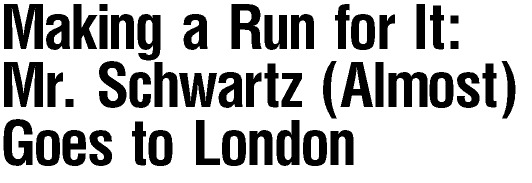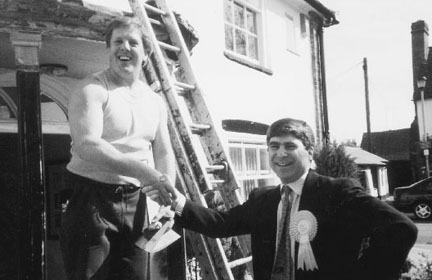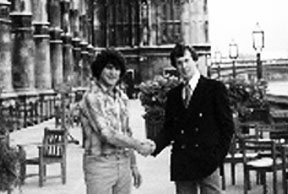The Rochester Review, University of Rochester, Rochester, New York, USA
![]()


By Jan Fitzpatrick
Others were rather less encouraging. Even the party treasurer cautioned him not to expect too much. Colleagues assured him that his candidacy was, on the face of it, a "ridiculous idea" since there had never been a male American Member of Parliament.
Setting a precedent of sorts, an American woman, Virginia-born Nancy Astor, had been elected an M.P. in 1919. But she was succeeding to her husband's vacated seat. Schwartz, on the other hand, would be running sans name recognition, on a left-of-center third-party ticket, in a predominantly conservative district.
Further, what popular support the Liberal Democrats have enjoyed is not necessarily reflected in the numbers of seats they traditionally hold in Parliament. As Bingham Powell, a Rochester professor of political science, points out, "In 1992, they got 17.8 percent of the popular vote, but they won only 20 out of 650 seats in the House of Commons because the party's support tends not to be concentrated in particular geographic areas."
Schwartz is not an easily discouraged guy, however, and when last spring's general election was called, he embarked on one of the great adventures of his life--his bid for a Parliamentary seat representing the citizens of Welwyn Hatfield, a suburban district some 20 miles to the north of London.
One of the first things he did after deciding to run was to call his former professor, Richard Fenno, the University's Kenan Professor of Political Science. A widely respected authority on the U.S. Congress who has written many books on the subject, Fenno says he used to "lament in class that none of my students had ever run for Congress. I'd tell them, 'When you get there, give me a call, and I'll write about you.' I guess Rod must have remembered that, because he got in touch with me last spring to say that he wasn't running for Congress, but he was running for Parliament."
Schwartz, who was a political science major, says that his fascination with politics was born under the tutelage of such faculty luminaries as Fenno, Gordon Black (now chairman and CEO of the political pulse-taker Harris Black International), and Professor Emeritus Peter Regenstreif.
For many students like Schwartz who went to college in the late '60s to mid-70s, says Fenno, the Vietnam War sparked an intense, personal interest in politics. He credits colleagues Black and Regenstreif with creating teachable moments in that turbulent time. "They organized disorganized sentiment into something constructive," Fenno says. "They redirected the students' energy from mere political agitation into producing real change by bending the political process to their ends."
Schwartz entered college the year of the Fall of Saigon, and by the time he was a sophomore was deep into his first presidential campaign--for the losing ticket, as it happened. Republican Gerald Ford, who became president when Richard Nixon resigned office, was running for a second term, and Democrat Jimmy Carter was the challenger.
Schwartz remembers vividly the rush he felt working as the campus Republican coordinator. "I put in probably 30 or 35 hours a week on Ford's campaign," he remembers. "Even though he lost, it was a fantastic experience. I met Ford, James Baker, James Buckley. I gave speeches, licked envelopes. I drank a bit less, and even with all the extra work, still got better grades."
While Schwartz was working for Ford, one of his professors, Regenstreif, was organizing the Carter effort for upstate New York. Although he was on the opposite side, "Rodney observed what we were doing and absorbed a lot from it," says Regenstreif. Schwartz agrees that he did learn a lot about the ropes and routines of running a campaign from Regenstreif and Black, including such basics as writing press releases, meeting with interest groups, getting identified with particular issues, doing polls, targeting letters, and so on.
Schwartz's next big lesson in politics came during his junior year, when he enrolled in the University's Parliamentary Internship program (see page 25) and went to London.
It was a venture that got off to an unpromising start. He was first assigned to work for an M.P. who was "one of life's detestable characters--one of those loathsome, spineless guys who slither around, giving politics a bad name." It was a bad match for a "keen, wet-nosed student" like himself, Schwartz declares, and he, budding politician that he was, managed to get himself reassigned to another M.P., Nicholas Winterton, whom he found to be "charming and exciting to work for."
"This was just before the Thatcher revolution, and you could see the change coming. I met many of the movement's top thinkers," Schwartz recalls. He found the experience intoxicating.
Between this first exposure to Parliamentary government and his bid to take his own place there, some 20 years of apolitical living intervened. Office-seeking took a back seat to finishing his education, marriage to Lisa Kriescher, "the woman I met at freshman orientation," and launching a career and a family.
After returning to Rochester to finish a 3-2 program that gave him a bachelor's degree in political science and an M.B.A. in finance and applied economics, Schwartz became a bank analyst at Paine Webber, where he displayed a precocious knack for knowing which stocks to buy: He promptly made Institutional Investor's "All-America" team, and for several years was rated No. 1 financial-services analyst in the country. But the thrill of reaching the top of his profession didn't last: "I was probably jaded by success too early," he now says. "I wanted a new challenge." That was in 1987. He wasn't yet 10 years out of college.
He and Lisa decided to relocate to London. Without a new job in hand, they picked up and moved. Just like that. It was a calculated risk that paid off. He wound up working for the British arm of Paine Webber, and then switched to Lehman Brothers, where he followed financial stocks. By 1991, he was managing director and co-head of equities for Lehman Brothers in Europe, and then, in 1994, made a "complete career change" once again. He became head of financial-institutions investment banking for Paribas, the premier French investment bank.
Politics was never far from his heart, however, and he found himself increasingly drawn to the views of the Liberal Democratic Party. He became regional spokesman on economic affairs for the Lib Dems, articulating to the chancellor of the exchequer what lack of investment in the UK would mean to the future of the country.
"My views have moved to the left since being in university," Schwartz says, summing up his political journey from Rochester to Welwyn Hatfield.
That's probably putting it mildly, says old friend Lisa Toelle, who counsels Rochester students in the Parliamentary Internship program. She also happens to be well connected to British politics herself as the wife of Labor M.P. Bruce George.
Though Schwartz wasn't one of Toelle's advisees back then, her husband the M.P. did get to know him and recalls the collegiate Schwartz as an earnest, eager right- winger who had big ideas about reforming Parliament. "We're very dear friends now," Toelle says. "What's neat about Rod is that the whole time he was having incredible success in the financial world, he became more left wing. As he achieved more personal material success, his views moderated. He has become a very thoughtful, insightful man."
In July 1996, just three years after gaining British citizenship, Rodney Schwartz --left-wing expatriate American banker --came to his decision to run for the Parliament he had wanted to shake up so many years before.
"I decided to run because I thought I could offer a different insight on certain issues from my background as an American and as someone trained in banking and finance," Schwartz says. "As the son of immigrant parents who survived the Holocaust and as an immigrant here myself, I have some life experiences that are different from other Members of Parliament."
Recognizing the odds against him, he tossed his hat into the ring.
Actually, prospects for third-party candidates are somewhat better in Britain than they are in the States, says Rochester's Bing Powell. "The country is smaller and it's easier to organize and get to know voters in smaller districts that have fewer than a quarter of the eligible voters in a Congressional district."
There are other ways, too, in which British campaigns are more manageable than their U.S. counterparts--most notably, of course, in their merciful brevity and modest cost.
Parliamentary elections don't officially begin until that body dissolves, and they end on election day, somewhere between three and six weeks later. So, although Schwartz had become the Liberal Democrats' designated candidate some months earlier and had been articulating party views as the spokesman on economic and financial issues for his region, he didn't formally start asking for votes until just three-and-a-half weeks before last May's general election.
Blessedly too, he was spared having to raise tons of money. The Brits impose strict limits on spending. "I was only allowed to spend about $11,000," he says. It's a situation that Americans, who face massive fundraising efforts to pay for a run for national office (something like $500,000 for a Congressional seat), can only dream about.
But the contrast between the two systems is narrowing. "One of the lines I used in my campaign was that I have seen the future and I don't like it," Schwartz says. "Though politics in the UK is gradually becoming more like politics in America, the last thing British citizens need is to have their parties beholden to special interest groups."
Schwartz dived into his campaign running on three key issues--government reform, education, and the environment --taking a candid stance with voters about costs and tradeoffs. "If I'm not honest with the electorate, if I don't really stick to issues, what's the point?"
His pay-as-you-go philosophy no doubt cost him support with some voters. The educational reforms he advocated, for instance--among them improvements in preschool education, smaller class sizes in elementary and secondary schools, and more training opportunities for teens and adults--"need real cash, not gimmicks." He points out that "the Lib Dems are the only party with the courage to state publicly that they would raise taxes to back this commitment."
Parliamentary intern Schwartz with M.P. Brown in 1978
One of the first such opportunities was the British Parliament Internship program, which placed Rochester undergraduates on the staff of a Member of Parliament, to help the M.P. conduct research, handle correspondence, or deal with constituent service. (This was the internship that gave Rodney Schwartz his introduction to British politics.)
Rochester was one of the first to offer these internships, but as other American universities also sought opportunities for their students, fewer openings with M.P.'s were available for Rochester students, says Lynda Powell, professor of political science and faculty advisor for the program. Therefore the University developed a new array of opportunities to combine work and study in Britain and across the Channel--in places like London, Brussels, Paris, Madrid, Bonn, and Cologne and in areas ranging from government, medicine, and law to business, tourism, and museology. Students from universities all around the country enroll in Rochester's internship programs.
"These are absolutely wonderful opportunities," says Jacqueline Levine, director of Study Abroad programs for the University. "Working and living in another country is challenging in the best sense: Students return from these internships having taken a dramatic leap forward in personal maturity and thoughtfulness."
As for improvements in government, many of this Yankee candidate's proposals displayed a peculiarly American twist: giving British citizens a Bill of Rights and a written constitution, passing a Freedom of Information Act, reforming the monarchy, transforming the House of Lords into a democratic second chamber, and modernizing the House of Commons.
Schwartz says he got a real kick out of campaigning, especially the give-and-take of engaging people in discussion about issues and winning over skeptics.
"You go where you need to go to deliver the message," he says. "One day we were in a strong Labor neighborhood, and some young teenagers came up, giving us a hard time. This kid said, 'Liberal Democrats suck. They're not cool.' So I asked him, 'Who's cool?' and he said Labor. So we talked for a while, and then I asked him if he wanted some buttons, and he did. He asked why Labor didn't give out buttons. I said, 'Well, why don't you ask them?' '' That was one neighborhood, Schwartz likes to believe, where Labor lost some of its cool.
During the heat of the campaign, Schwartz every week cranked out about five press releases, appeared once or twice on radio or TV for interviews, and engaged opponents in one or two debates. He figures he must have stopped at hundreds of shops, train stations, and private homes to shake hands, make a point, or give a speech. He guesses he met around 15,000 people, and pressed leaflets into as many hands.
His campaign day began as early as 6:30 a.m., if he was meeting commuters at the train station, and stretched well into the evening whenever he was delivering a speech or engaging in a debate.
On May 6, just three-and-a-half weeks after it began, it was all over. As was widely discussed in the American press, the country swung to the left, and the Tories, in power for 18 years, lost spectacularly to Labor. But the leftward tilt was not enough to save Schwartz's third-party candidacy. He did, however, he reports with justifiable pride, finish a good two percentage points ahead of predictions--which, he was told, was "quite an accomplishment" in a country where voters are far more likely than they are in the States to vote the party ticket. But in the end, he was unable to overcome the heavy odds against his candidacy.
Yet Schwartz is at peace with the outcome, having had the run of his life. The rough-and-tumble excitement of helping shape British politics and policies, and of engaging citizens in talking about their country and community, is now in his blood. And he isn't about to give it all up. In fact, immediately after the election--in yet another turnaround in his career--he resigned from his bank to consider "a broader array of options."
As the father of a 13-year-old son and three daughters aged 8, 6, and 5, Schwartz believes that being involved with politics makes an important statement to the kids. "I want them to see that there is more to life than making money. I want them to understand that on some level, we all have an obligation to get involved."

No male American has ever made a successful bid for a seat in the British Parliament. So Rod Schwartz '79, '80S (MBA) thought he'd give it a try. Okay, so he didn't win. But he had a heckuva time making the run.
When London banker Rodney Schwartz, a British citizen only since 1993, told his wife he was thinking about standing for Parliament as a Liberal Democratic candidate, she saw a mid-life crisis looming. But, loyal wife that she was, she didn't exactly try to talk him out of it. ("She just said it was cheaper than a Lamborghini and less disruptive than a mistress," Schwartz says.)

On the campaign trail: Schwartz estimates he met 15,000 people during his three-week run, including a former UK kung fu champ (above).
On the environment, Schwartz argued for making polluters pay higher taxes, and for raising levies on gasoline and investing the proceeds in public transportation.
'Hands-On' Overseas

Freelance writer Jan Fitzpatrick has been a frequent contributor to Rochester Review.

Copyright 1997, University of Rochester
Maintained by University Public Relations